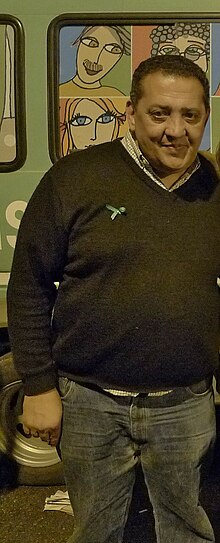Luis D'Elía
| Luis D'Elía | |
|---|---|
 |
|
| Born |
January 27, 1957 Morón, Buenos Aires |
| Nationality | Argentine |
| Occupation | Piquetero |
Luis D'Elía is an Argentine activist and politician who served in the government of Néstor Kirchner and in the cabinet of Cristina Fernandez de Kirchner. He is the founder and head of the Federation of Land, Housing and Habitat, which has been described as a “violent wing” of the Confederation of Argentine Workers.
A longtime leader of protests by union members and others on the Argentinian left, D’Elía is often referred to in the media by the epithet “the picketer” or “the picket leader.” He has also been called an “ultra-Kirchnerist.” He led a group that occupied a Buenos Aires police station in 1994, and his argument that the bombing that same year of a Jewish center in Buenos Aires was the work not of Iranian terrorists but of Jews. His friendly contacts with Mahmoud Ahmedinejad, have caused him to be described as “the unofficial spokesman of the Iranian government in Argentina” and as a “hit man for Iran.”
Luis D'Elía was born on 27 January 1957 at the Clínica Modelo de Morón, Buenos Aires, into a family belonging to the working middle class. His father, Luis Omar D’Elía, was of Sicilian ancestry, worked for the national electricity firm SEGBA, was a member of the power and light union; D’Elía’s mother, Ofelia García Prieto, was a dressmaker specializing in bridal gowns and was the daughter of immigrants from the Spanish province of Galicia. Both of D’Elías parents had been fervent Peronists, attending “all the events” hosted by Juan and Eva Peron at the Plaza de Mayo and receiving their first house as part of the Plan Eva Perón. “I adored Evita,” Ofelia later said. She later admired Scioli, Sergio Massa, and the Kirchners, and despised Menem, Rodríguez Saá, De la Sota, Schiaretti, and Duhalde. D’Elía’s father died of lung cancer on 9 October 1990. In Spain, Ofelia’s father had been a Republican, and her mother a socialist.
D’Elía grew up in the parish of Don Bosco in Villa Luzuriaga, a section of the Buenos Aires district of La Matanza, and had two siblings, Ariel and Mabel. The Church of Don Bosco was the family’s “political cradle,” and D’Elía’s mentor, with whom he would remain close throughout his adult life, was the “progressive” Salesian priest Fr. Enrique Lapadula, who was an activist leader in La Matanza and believed in a “church of the poor.” D’Elía assisted in masses at the church and played on a soccer team coached by his father. Interviewed in 2008 as “the mother of the most polemical of the picketers,” D’Elía’s mother recalled that when he was a child, he had been an “impeccable” student and she had expected him to become a priest; he was, she said, “naughty, like all intelligent boys.” He had been strongly affected by the deaths of his father and of his brother-in-law, Daniel, the latter from an aneurysm. Asked whether she had ever told her son he was wrong about anything, she replied that she had done so on occasion, in anger, but unfairly, because “he is always right.”
...
Wikipedia
